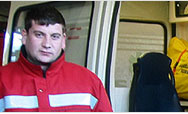You are here » Home » Telling Our Story
Success Story
Educators travel to the United States to learn more effective teaching methods
Teachers Bring Home New Approaches

| |
Photo: USAID/Reverie Zurba
|
|
USAID-supported math and science teachers improve South Africa’s educational system.
“Let me start to help these teachers improve their methods. Then South Africa’s education system can change positively, following in the steps of countries like America.”
|
As a poor child in rural South Africa in the 1960s, Thandi Mgwenya loved to learn, but she hated school. One of the most insidious
practices of apartheid — with the longest-
lasting effects — was the vastly inferior education received by the majority of South Africans. Thandi’s school had no electricity or running water. Her parents struggled to use their sparse income to send all of their children
to school, even though her mother had never set foot in a classroom and her father dropped out in first grade.
Today Thandi is a teacher — and one of the first graduates of a USAID-supported program
to help educators improve math and science teaching in South Africa. Under the program, educators are sponsored to come to the United States to observe schools and attend workshops on learning strategies, curriculum
development, assessment, management,
materials and leadership. The program focuses on math and science — neglected subjects that have the most direct connection to economic development. Project director Marilyn Pugh says the aim of the initiative is to “help equip South African educators to return
to their country, restructure high school [math, science and technology] education and build economic capacity in South Africa.”
Currently, Thandi’s home, Mpumalanga Province, has a population of three million people. Ninety percent of its schools are rural, and nearly a third of residents over 20 have never been to school. Since she was sponsored in 2003, Thandi has taken it upon herself to improve this situation by sharing her knowledge with her fellow educators. She plans to mentor at least three teachers from each of 43 schools in Mpumalanga Province, showing them how to prepare lesson plans, work with graphic calculators, communicate with students and arrange more training opportunities for teachers of technical subjects.
Thandi is able to influence many South African schoolchildren through her job, and she says that South Africa’s schools are much better today, “but students complain about lacking books in some subjects. And they complain about the poor condition of their laboratories.... The libraries are even worse.
”In a place where education progress is guaged by the number of schools with electricity
and water, Thandi and her colleagues have a lot of work ahead of them. It is a long-term process, but Thandi believes they are moving in the right direction. “Let me start to help these teachers improve their methods,” she said. “Then South Africa’s education system can change positively, following
in the steps of countries like America.”
Print-friendly version of this page (254kb - PDF)
Click here for high-res photo
Back to Top ^ | 

